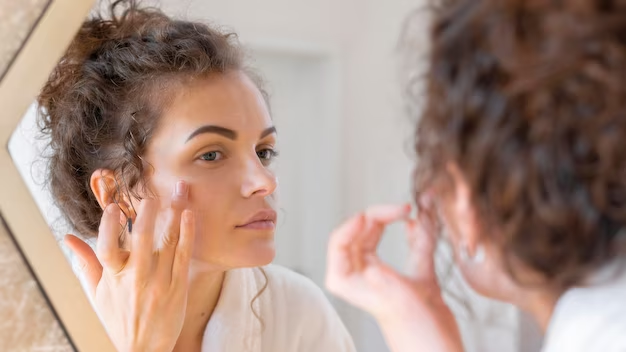The skin barrier is the body’s first line of defense against the environment, shielding us from harmful pollutants, ultraviolet rays, and bacteria. When this protective shield is compromised, we might experience a variety of unpleasant symptoms ranging from dryness and irritation to more severe skin conditions. But how do you fix skin barrier damage? Common signs include persistent dryness, a dull or uneven complexion, sensitivity to skincare products you used to tolerate well, redness, and an increase in breakouts. Addressing these concerns promptly can prevent long-term damage, promoting a resilient and healthy complexion.
Can skin barrier repair itself? The well-being of our skin barrier is often overlooked but understanding its function and recognizing the telltale signs of impairment can prevent larger issues. The following chapters will guide you through the identification process and help pinpoint the causes behind your skin’s distress.

Recognizing Signs of Damage
Physical Symptoms of a Compromised Skin Barrier
Being aware of changes in your skin’s appearance and texture is crucial. Physical indicators that your skin barrier may be damaged include:
- Dryness and Flakiness: Your skin loses its ability to retain moisture, leading to a rough and flaky surface.
- Itching and Redness: Compromised skin often leads to irritation and red patches, which can be itchy.
- Sensitivity and Burning Sensation: Products that once felt soothing may now cause a stinging or burning sensation.
If your skin exhibits any of these symptoms persistently, it’s an indication that the barrier may be struggling.
Long-Term Implications of Ignored Symptoms
Not addressing the signs of skin barrier damage can lead to exacerbated issues, such as:
- Persistent inflammation that may contribute to premature aging.
- Increased susceptibility to environmental damage from pollutants and UV rays.
- Development or worsening of skin conditions like eczema or rosacea.
| Environmental Factors | Lifestyle Impact | Skincare Missteps |
|---|---|---|
| Harsh weather | Poor Diet | Overexfoliation |
| Pollution | Stress | Harsh Cleansers |
| UV Exposure | Lack of Sleep | Wrong Product Use |
Causes of Skin Barrier Damage
The causes behind a damaged skin barrier are manifold and often interconnected. Below are some common factors:
- Common Environmental Factors: Elements such as extreme temperatures, wind, and pollution can strip away at your skin’s natural lipids, weakening its protective functions.
- Lifestyle Choices and Their Impact: Choices like a nutrient-poor diet, high stress levels, and insufficient sleep patterns can negatively impact your skin’s ability to repair itself.
- Skincare Products & Routine Missteps: Common errors in skincare such as over-exfoliating, using products with harsh ingredients, or frequent changes in your skincare routine can severely disrupt your skin barrier’s integrity. It’s vital to understand the ingredients and their effects on your skin type.

The Road to Recovery
The journey to restoring a damaged skin barrier starts with a strategic and gentle approach:
- Professional Diagnosis and Treatment Options: An appointment with a dermatologist can provide a comprehensive understanding of your skin’s condition and tailored solutions.
- At-Home Care Strategies: Adopting a simplified skincare routine—focusing on hydrating, repairing, and soothing ingredients—is key to recovery. Avoiding potential irritants and implementing a gentle cleansing and moisturizing regimen will aid in the healing process.
Daily At-Home Care Strategies:
- Hydration and Moisturization Tips:
- Use products with hyaluronic acid and glycerin that attract water to the skin.
- Look for barrier-reinforcing ingredients like ceramides and fatty acids.
- Limit hot showers which can strip your skin of natural oils.
- Protective Measures to Prevent Further Damage:
- Always apply a broad-spectrum sunscreen daily to protect against UV radiation.
- Wear protective clothing and seek shade during peak sun hours.
- Incorporate antioxidants in your skincare routine to fight against environmental aggressors.
Importance of Patience in Skin Barrier Healing: Healing a damaged skin barrier doesn’t happen overnight—it can take anywhere from a few weeks to a few months, depending on the level of damage and your skin’s innate healing ability.
Prevention and Maintenance of a Healthy Skin Barrier
Maintaining a healthy skin barrier is an ongoing process that requires consistent care and attention. It’s not only about quick fixes but adopting a lifestyle and skincare routine that promote long-term health. In this chapter, we explore daily habits that are key in keeping your skin barrier resilient against external aggressors.
- Gentle Skincare Techniques: Use lukewarm water instead of hot for cleansing to prevent skin dehydration. Pat your skin dry with a soft towel instead of rubbing, to avoid irritation. Apply your skincare products in a delicate manner without pulling or stretching the skin.
- Recommended Ingredients for Barrier Repair: Ceramides, cholesterol, and free fatty acids help replenish the skin’s natural lipids. Niacinamide can improve the skin’s elasticity and barrier function. Antioxidants like Vitamin C and E protect the skin from oxidative stress.
It’s vital to recognize when home care is insufficient, and professional advice is needed. If you experience severe symptoms, such as excessive inflammation, persistent discomfort, or if your skin does not improve with over-the-counter treatments, consult with a dermatologist.

Conclusion
In conclusion, understanding and responding to the signs of a damaged skin barrier is crucial for maintaining skin health. Recognizing the symptoms of barrier damage, addressing the root causes, and employing recovery strategies can lead to significant improvements. Implementing a prevention-centric approach will further ensure the integrity and health of your skin barrier. Listening to your skin and adjusting your skincare practices accordingly is a lifelong commitment that pays off in a beautiful, resilient complexion.
FAQs
- What is the best ingredient for repairing the skin barrier? One of the most potent ingredients for repairing the skin barrier is ceramides. They are lipids that naturally occur in the skin and play a key role in maintaining moisture and protecting against environmental damage.
- How long does it take for the skin barrier to heal? The healing process can vary widely depending on the extent of the damage and an individual’s skin type. Typically, it can take anywhere from two weeks to several months for the skin barrier to fully repair itself.
- Can diet affect the health of my skin barrier? Absolutely. A balanced diet rich in omega-3 fatty acids, antioxidants, and vitamins can significantly benefit the skin barrier. Foods like fish, nuts, and green leafy vegetables are great for skin health.
- How can I differentiate between sensitive skin and a damaged skin barrier? Sensitive skin is a skin type that is prone to reacting to various stimuli. In contrast, a damaged skin barrier is a condition that can affect any skin type and is often characterized by symptoms like increased sensitivity, dryness, and irritation.
- Are there specific skincare brands recommended for damaged skin barriers? Rather than specific brands, it’s more critical to look for products that contain ingredients conducive to barrier repair, such as hyaluronic acid, ceramides, and niacinamide. Several brands offer products aimed at strengthening the skin barrier, so do your research or consult a professional for recommendations.





